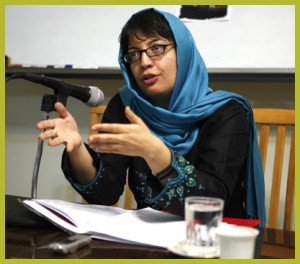Shadi Sadr & Slavoj Zizek
 Signandsight.com, one of the good sources for European news-commentary, is taking a summer break, during which there will be no weekly updates from the Feuilletons or Magazine Roundup. They will, however, be posting a number of new features to keep the dog days barking.
Signandsight.com, one of the good sources for European news-commentary, is taking a summer break, during which there will be no weekly updates from the Feuilletons or Magazine Roundup. They will, however, be posting a number of new features to keep the dog days barking.
Here’s one now:
The future of Iranian feminism
Shadi Sadr, an Iranian feminist and human rights activist working as a lawyer and journalist, was released on bail from Tehran’s Evin prison last Tuesday. Haideh Daragahi looks at an article written by Sadr, which may have triggered her arrest. It is a blueprint for the future of the Iranian women’s movement and how it should relate to the new movement for change that is rocking Iran. Click here.
***
And also, from a recent London Review of Books, here a link to Slavoj Zizek’s reflections on what has been happening in Iran, an article entitled “Berlusconi in Tehran,” and that starts:
When an authoritarian regime approaches its final crisis, but before its actual collapse, a mysterious rupture often takes place. All of a sudden, people know the game is up: they simply cease to be afraid. It isn’t just that the regime loses its legitimacy: its exercise of power is now perceived as a panic reaction, a gesture of impotence. Ryszard Kapuściński, in Shah of Shahs, his account of the Khomeini revolution, located the precise moment of this rupture: at a Tehran crossroad, a single demonstrator refused to budge when a policeman shouted at him to move, and the embarrassed policeman withdrew. Within a couple of hours, all Tehran had heard about the incident, and although the streetfighting carried on for weeks, everyone somehow knew it was all over. Is something similar happening now?
There are many versions of last month’s events in Tehran. Some see in the protests the culmination of the pro-Western ‘reform movement’, something along the lines of the colour-coded revolutions in Ukraine and Georgia. They support the protests as a secular reaction to the Khomeini revolution, as the first step towards a new liberal-democratic Iran freed from Muslim fundamentalism. They are countered by sceptics who think that Ahmadinejad actually won, that he is the voice of the majority, while Mousavi’s support comes from the middle classes and their gilded youth. Let’s face facts, they say: in Ahmadinejad, Iran has the president it deserves. Then there are those who dismiss Mousavi as a member of the clerical establishment whose differences from Ahmadinejad are merely cosmetic. He too wants to continue with the atomic energy programme, is against recognising Israel, and when he was prime minister in the repressive years of the war with Iraq enjoyed the full support of Khomeini.

 Poasis II: Selected Poems 2000-2024
Poasis II: Selected Poems 2000-2024 “Todesguge/Deathfugue”
“Todesguge/Deathfugue” “Interglacial Narrows (Poems 1915-2021)”
“Interglacial Narrows (Poems 1915-2021)” “Always the Many, Never the One: Conversations In-between, with Florent Toniello”
“Always the Many, Never the One: Conversations In-between, with Florent Toniello” “Conversations in the Pyrenees”
“Conversations in the Pyrenees” “A Voice Full of Cities: The Collected Essays of Robert Kelly.” Edited by Pierre Joris & Peter Cockelbergh
“A Voice Full of Cities: The Collected Essays of Robert Kelly.” Edited by Pierre Joris & Peter Cockelbergh “An American Suite” (Poems) —Inpatient Press
“An American Suite” (Poems) —Inpatient Press “Arabia (not so) Deserta” : Essays on Maghrebi & Mashreqi Writing & Culture
“Arabia (not so) Deserta” : Essays on Maghrebi & Mashreqi Writing & Culture “Barzakh” (Poems 2000-2012)
“Barzakh” (Poems 2000-2012) “Fox-trails, -tales & -trots”
“Fox-trails, -tales & -trots” “The Agony of I.B.” — A play. Editions PHI & TNL 2016
“The Agony of I.B.” — A play. Editions PHI & TNL 2016 “The Book of U / Le livre des cormorans”
“The Book of U / Le livre des cormorans” “Memory Rose Into Threshold Speech: The Collected Earlier Poetry of Paul Celan”
“Memory Rose Into Threshold Speech: The Collected Earlier Poetry of Paul Celan” “Paul Celan, Microliths They Are, Little Stones”
“Paul Celan, Microliths They Are, Little Stones” “Paul Celan: Breathturn into Timestead-The Collected Later Poetry.” Translated & with commentary by Pierre Joris. Farrar, Straus & Giroux
“Paul Celan: Breathturn into Timestead-The Collected Later Poetry.” Translated & with commentary by Pierre Joris. Farrar, Straus & Giroux